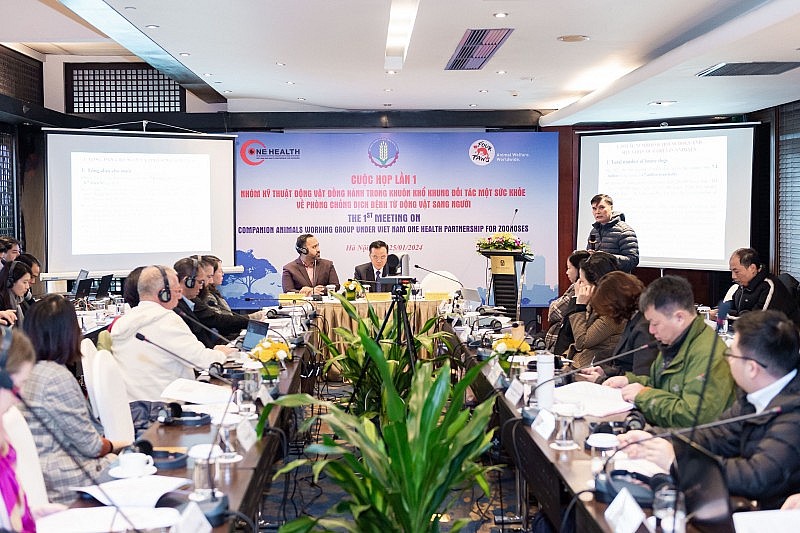At the beginning of January, news of the South Korean National Assembly passing a law banning the consumption and trade of dog meat stirred up public opinion in Vietnam and around the world. Looking from South Korea to Vietnam, both countries have long-standing habits of consuming dog meat. Cambodia also has a history of dog meat consumption, although in July 2020 Siem Reap, a major province in Cambodia, banned the trade, sale and slaughter of dogs for their meat. Organisations in Vietnam have been campaigning and advocating for an end to this cruel trade for years.
The ramifications of the dog and cat meat trade
“We need to look to our neighbours, such as South Korea and Cambodia, which have had strict regulations on illegal confinement, slaughter of dogs and cats, so there is no reason why Vietnam cannot do it and learn from the progress of animal welfare in general and companion animals in particular,” said Mr. Vu Thanh Liem, Head of the One Health Partnership Secretariat (OHP). He emphasised this during the first meeting of the OHP Technical Working Group for Zoonoses Control, held in Hanoi at the end of January 2024. This shows that the trade and slaughter of dogs for their meat, along with the negative impacts on animal welfare, are receiving significant attention in Vietnam.
According to the global animal welfare organisation – FOUR PAWS, every year, an estimated 10 million dogs and cats are captured, transported, and slaughtered for their meat in Cambodia, Vietnam, and Indonesia. In Vietnam alone, this number reaches 6 million dogs and cats. Many of these animals are stolen pets or community animals taken from the streets to supply the trade. The sheer scale of the trade and the huge amount of suffering makes it one of the most severe companion animal welfare issues in Asia. In addition, there are severe health implications – with links between the dog and cat meat trade and rabies, as well as conditions ripe for other zoonotic disease emergence. Dr. Nguyen Thi Thanh Huong, Head of the Office for Control and Elimination of Rabies in Humans, Vietnam National Institute of Hygiene and Epidemiology, Ministry of Health shared on the World Rabies Day 2023, , “The dog and cat meat trade in Vietnam, including slaughter, and the cross-border trafficking of live dogs has caused many consequences and obstacles for rabies control in humans and animals, as well as for achieving the 2030 goal of zero human deaths from dog-transmitted rabies. The dog and cat meat trade also poses a risk of direct transmission and interference with vaccination of dogs and cats, which undermines efforts to achieve of herd immunity.”
Dr Karanvir Kukreja, Head of Companion Animals Campaigns Southeast Asia at FOUR PAWS, stated: “The increasing number of zoonotic diseases and outbreaks of animal origin in the past few decades and the increasing frequency with which these happen – SARS-COV-1, Avian Influenza, Ebola – and quite likely – COVID-19 – highlights that in taking care of the world’s health, one must consider the interface between humans, animals, and the environment. However, it is also important to consider the welfare of animals and humans as part of efforts to prevent the next pandemic – as this can play a key role in the likelihood of emergence and spread of novel pathogens.”
Not only that, but other societal repercussions such as causing emotional harm to people whose pets are stolen, altercations between pet owners and thieves, and cases of poisoning, are regularly reported in the media. A reporting tool for theft activities of dogs and cats established by FOUR PAWS recorded over 150 reports in just 2 months of operation in Quang Nam and Da Nang, estimating that up to 1,737 dogs have suffered due to brutal dog meat trading practices.

OHP Companion Animals Technical Working Group meeting on zoonotic disease control.
Changes are happening
Many Vietnamese and international organisations have been at the forefront of promoting the cessation of dog meat trade and advocating for laws prohibiting such trade.
Leading the way is Hoi An City, Quang Nam Province, where in December 2021, the Hoi An People’s Committee signed a memorandum of understanding (MoU) with FOUR PAWS committing to phase out the dog and cat meat trade in the area. The event made headlines in the media and social discourse. Two years later, in December 2023, Hoi An made waves again by successfully partnering with FOUR PAWS to persuade one of the last three dog meat restaurants in the ancient city to close, saving hundreds of animals from being killed and consumed at this establishment every year. This is a positive step by the Hoi An authority in gradually eradicating the dog meat trade and serves as inspiration for other localities to follow their example.
Mr. Nguyen The Hung, Vice Chairman of the Hoi An city People’s Committee, stated, “While we know there is still work to do, this restaurant closure marks yet another step towards phasing out the dog and cat meat trade from our city, and we encourage other cities across Vietnam to do the same.” At the first meeting of the OHP Companion Animals Technical Working Group mentioned above, some members proposed that the Working Group identify additional areas in Vietnam to pilot projects aimed at ending the dog and cat meat trade.
The effect of South Korea, Siem Reap (Cambodia), and Hoi An saying no to dog meat has had a significant ripple effect. This shows how societies are moving away from eating dog meat, choosing instead to put an end to this cruel and unnecessary trade
However, Vietnam has much work to do to realise this desire. In addition to enacting laws prohibiting consumption and trade, addressing livelihoods for dog meat traders, as well as maintaining and caring for dog populations in business establishments when they close, are crucial issues to be addressed. South Korea is the world’s first country with dog farms, slaughtering approximately 2.5 million dogs annually. The passage of laws in this country banning the consumption and trade of dog meat, with penalties of up to 3 years in prison or fines of up to 30 million won (about $23,000), demonstrates a determined effort to eradicate this practice. According to a survey by the Humane Society International, about 70% of South Koreans oppose eating dog meat. In Vietnam, public attitudes are gradually changing as well. According to a FOUR PAWS survey in 2021, up to 91% of the population wishes for the Vietnamese government to take action to issue a ban on dog and cat meat trade; 88% support such a ban. The prohibition of consumption and the trade , as well as animal welfare, is a complex issue involving multiple stakeholders, thus requiring united efforts and various supportive solutions from all sectors and relevant parties in society.
The article is also featured on: https://congthuong.vn/can-som-loai-bo-tap-tuc-an-thit-cho-302337.html
About Pioneer
Pioneer Marketing & Public Affairs is a premier Vietnam-based consultancy that provides a diverse range of insight-driven solutions to clients in various industries. Founded in 2004, we have been offering public-affairs and marketing communications solutions to clients in aviation, banking, e-commerce, fintech, FMCG, nutrition, and information and communications technology. For more information, please visit: https://pioneervn.com/who-we-are/


